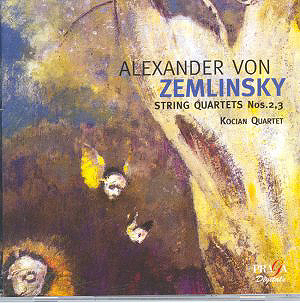The
Great War and nine fateful years divide these two works from each
other.
The
Second Quartet was started by Zemlinsky in 1913 and was
completed one year after hostilities had begun. It is of considerable
length - not prolix - but certainly expansive and confident. Zemlinsky
feels no need for earlier models. Complex drapes of expressionistic
music unfold with an easy drawl. The music is reminiscent of that
of Bernard van Dieren and of the string writing in Peter Warlock's
Curlew-Yeats cycle are plain to hear. Maybe it is just that I
have heard the piece more often but the long finale seemed to
cohere more effectively with the Kocians than the Schoenberg Quartet
on Chandos. On the downside the Kocians have wirier violin sound
than the Schoenbergs.
The
Second had to wait until the year of completion of the Third
Quartet before its premiere by the Rosé Quartet in
Vienna. However it was the Buxbaum and not the Rosé
who premiered the Third in Vienna on 26 October 1924. It is more
succinct and its method and surface are uncompromisingly modernistic.
The Theme and Variations second movement is at times tirelessly
Webernian. The Romanza is more overtly lyrical although the way
is, metaphorically speaking, still strewn with lichen and dotted
with stagnant pools. The Burleske finale chatters and chugs
- full rhythmic interest.
In
1924 Zemlinsky had only another fourteen years to go before the
Nazi ascendancy forced his flight to the USA. He stayed until
pushed, leaving in 1938, very late in the day. The USA was not
the Utopia he might have hoped. He died in destitution with his
music (fifty or so works) only regaining the light from 1978 onwards.
The
Chandos set will suit you if you want the complete Zemlinsky works
for quartet. If you would like a sampling then now that the individual
Nimbus CDs are out of the catalogue this is the disc to go for.
The
Third Quartet has been issued before in 1996 on Praga PR 250 092.
These
are two imaginative Viennese quartets from either side of the
Great War; one expressionistic and full of decadent colour (a
superbly sustained and magical finale) ; the other beholden to
Schoenbergian method.
Rob
Barnett
